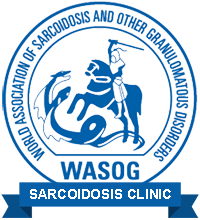The clinical value of serum soluble interleukin-2 receptor in pulmonary sarcoidosis
Abstract
Background: Sarcoidosis is a multi-system granulomatous disease in which T-helper type 1 cytokines play a key role. We evaluated the clinical value of serum soluble interleukin-2 receptor (sIL-2R) as a marker of disease activity and prognosis in sarcoidosis. Methods: This study included 67 patients who were newly diagnosed with sarcoidosis from 2006 to 2012 at our department. The clinical and follow-up data were retrospectively collected from their medical records. Results: The mean (±SD) age of the patients was 53.9±15.4 years; 41 patients were women and were significantly older than men. Serum angiotensin-converting enzyme had a mean value of 15.3±6.1 U/L and a positive rate of 10.4%. Serum sIL-2R had mean level of 818.8±453.1 U/mL and a positive rate of 45.9%. Moreover, the sIL-2R level of patients who had lung parenchymal lesions was significantly higher than that of patients who had no lung parenchymal lesions. Fifty-two patients who had no medications were followed up at our hospital for a median period of 37 months (range, 0–107 months). Patients who demonstrated chest imaging evidence of exacerbation (n = 8) tended to have higher sIL-2R levels than those who remained stable. Conclusion: Serum sIL-2R may have a role as a diagnostic and prognostic marker in pulmonary sarcoidosis.
Downloads
Published
Issue
Section
License
This is an Open Access article distributed under the terms of the Creative Commons Attribution License (https://creativecommons.org/licenses/by-nc/4.0) which permits unrestricted use, distribution, and reproduction in any medium, provided the original work is properly cited.
Transfer of Copyright and Permission to Reproduce Parts of Published Papers.
Authors retain the copyright for their published work. No formal permission will be required to reproduce parts (tables or illustrations) of published papers, provided the source is quoted appropriately and reproduction has no commercial intent. Reproductions with commercial intent will require written permission and payment of royalties.

This work is licensed under a Creative Commons Attribution-NonCommercial 4.0 International License.








